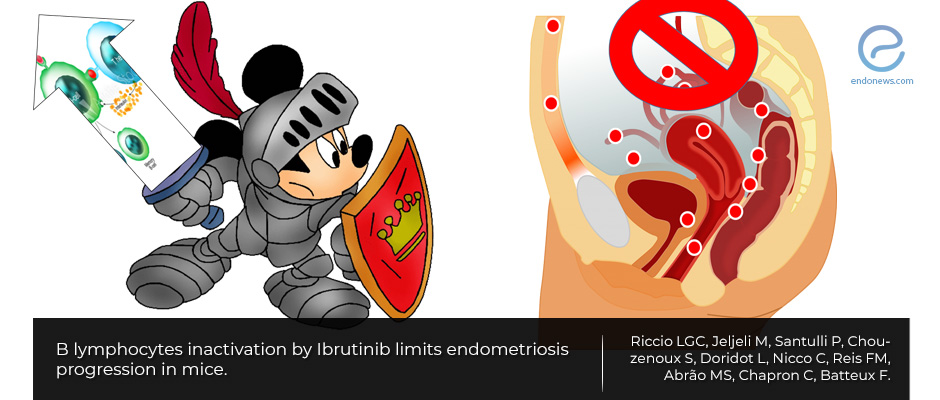Control on endometriosis progression by a "tyrosine kinase inhibitor"
Jul 3, 2019
Ibrutinib treatment reduces the size and the activity of the endometriosis lesions in mice.
Key Points
Highlights:
- Bruton’s tyrosine kinase inhibition using "Ibrutinib" causes activated B cells to skew toward regulatory B cells and prevents endometriosis progression in mice while B cell depletion using antibody has no effect.
Importance:
- This study can be a guide to further studies and the development of new immunoregulatory therapeutic strategies for endometriosis.
Objective:
- Authors aimed to test the effects of B lymphocyte inactivation or depletion on the progression of endometriosis.
What’s done here?
- Thirty mice that underwent endometrial transplantation were compared between treated (Ibrutinib or Anti-CD20) and control mice endometriosis by volume, weight, ultrasonography, histology and target genes expression.
- Activated and regulatory B cells, T lymphocytes and macrophages were phenotyped by flow cytometry on the isolated spleen and peritoneal cells.
Key results:
- Ibrutinib controlled endometriosis progression in mice, while total anti-B cell depletion had no effect on the activity and growth of endometriotic lesions.
- Ibrutinib reduced the mRNA expression of both inflammatory and fibrotic markers in the implants, but there were no differences in Anti-CD20 Group and the controls.
- Ibrutinib skewed activated B cells toward regulatory B cells in mice with endometriosis, and the number of macrophages decreased in the peritoneal cavity.
- Cytokine expression was also different in the serum and peritoneal fluid of endometriotic mice, compared to the controls.
- T lymphocyte markers were not significantly different between Ibrutinib and Control groups.
Limitations of the study:
- Whether B cell depletion by the anti-CD20 or inactivation by Ibrutinib can prevent the establishment and/or progression of endometriosis in humans is not clear.
Lay Summary
B cells, which are important players of the immune system, are increased in the blood and peritoneal cavity of endometriosis patients. Activation of B cells and the presence of anti-endometrial autoantibodies have been also been described in women with endometriosis, but their exact role in the disease mechanism is not known.
Ibrutinib is a tyrosine kinase inhibitor which is essential for development and function of B cells. In order to better characterize the role of B cells on endometriosis, Riccio et al., from Paris, France, tested their hypothesis that B cell depletion with anti-B-Cell antibody or inactivation with a tyrosine kinase inhibitor, namely "Ibrutinib" interferes with endometriosis progression.
Researchers surgically induced endometriosis in mice by transplantation of uterine tissue. The mice were randomly separated into three groups, Ibrutinib, Anti-CD20, and Control. Twenty-one days after implantation, animals were sacrificed. Blood samples were collected, peritoneal cells collected from washings, and spleens were removed. Endometriotic implants were also collected, weighed and measured. The implants were histologically and biochemically analyzed.
In this study, researchers showed that 3 weeks after the injection anti-B-cell antibodies did not reduce the size of endometriosis. On the contrary, treatment with Ibrutinib decreased not only the size and the activity of the endometriotic lesions but also decreased the expression of inflammatory and fibrotic markers as well. Inflammatory cytokines were also altered.
The findings of this study revealed that Ibrutinib seems to control endometriosis progression by inhibition of Btk pathway and its effects on regulatory B cells rather than its role on T cells.
In summary, Ibrutinib, a drug approved by the Food and Drug Administration that target immune cells were tested and found to be effective in controlling the endometriosis progression in mice. Since this study has the limitations of using an animal model, further studies are needed to apply these findings for human treatment.
Research Source: https://www.ncbi.nlm.nih.gov/pubmed/?term=31247078
endometriosis thyrosine kinase inhibitor anti-cd20 treatment ibrutinib B cells T cells immune system

